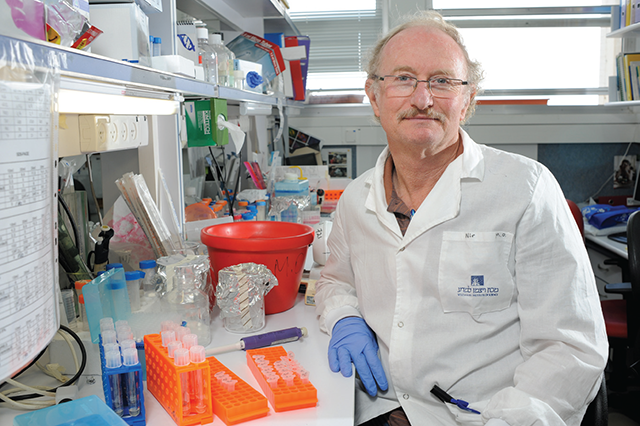A bold new initiative at Weizmann takes direct, comprehensive, thoughtful aim at cancer

Prof. Moshe Oren, Head, Moross Integrated Cancer Center
Several decades after President Nixon declared war on cancer, it remains one of the most common and deadliest diseases worldwide, with scientists still working feverishly to unravel the complexities that make fighting it – much less defeating it – so difficult. The Weizmann Institute of Science realized that a different way of looking at cancer was needed – a holistic approach that considers cancer in its totality, that incorporates information from the genomics revolution, that harnesses the power of personalized medicine.
This fresh strategy is embodied by the Institute’s newly established Moross Integrated Cancer Center (MICC), a flagship project intended to not only support and produce the finest basic research in cancer, but also to move findings from the lab to the clinic – a process known as technology transfer. Coordination and collaboration with academic researchers from around the world and physician-scientists from hospitals across Israel will help ensure this process. Believing that knowledge should be shared and is the common ground all scientists build upon, clinicians, scientists, researchers, and others will be able to conduct investigations at the MICC. The Institute envisions that the MICC will serve as a hub for inspiring, enabling, and stimulating groundbreaking science.
Headed by renowned cancer researcher Prof. Moshe Oren – whose 30-plus years of research on the tumor suppressor gene p53 has led to numerous advances, including the first clinically approved anti-cancer gene therapy – a primary goal of the MICC is to increase our understanding of cancer. Even after scientists worldwide have studied cancer for decades, there is still much we do not know – and how can we cure what we don’t understand?
The foresight and thoughtfulness that have gone into the MICC’s setup is key to gaining this understanding, and to the MICC’s future success. It will have a solid basic research component, with three separate “sub-institutes” – the Institute for Cancer Prevention Research, the Institute for Cancer Diagnosis Research, and the Institute for Cancer Therapy Research – that will each employ Weizmann’s multidisciplinary strength to elucidate cancer and develop innovative approaches to combat it. The second major component of the MICC is infrastructure: an advanced preclinical cancer laboratory, a tumor bank, and a live cell imaging and sorting facility. Both the basic research and infrastructure components will utilize a Clinical Collaboration Fund, which will enable the sharing of patient samples for research purposes and foster close interaction with hospital physicians treating cancer patients, with the goal of implementing the MICC’s basic research discoveries and improving medical oncology practice.
Meticulous planning, an approach that takes into consideration all aspects of cancer, the involvement of colleagues across disciplines, the sharing of information: the MICC may be just the weapon we need to make the war on cancer a thing of the past, once and for all.
